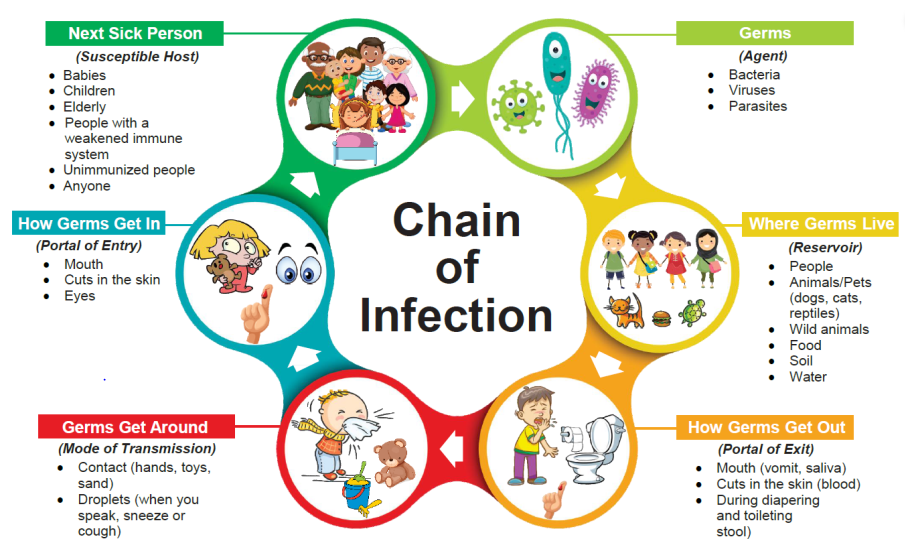- Acute Respiratory Illness Guidance Feb 2025
- COVID-19 Guidance Feb 2025
- Influenza Guidance Feb 2025
- Gastrointestinal Illness Guidan
Minimizing the Risk of Illness
When considering how best to prevent or minimize the risk of illness to ourselves and those close to us the chain of infection can help us identify areas where we prevent infections from occurring. By breaking the chain at any point, we can prevent ourselves and others from becoming ill.

Starting in the top right corner of the diagram the “Agent” (Germs) and “Where Germs Live” (Reservoir) are difficult factors for us to control. It is true that some illness has been eradicated, such as Small Pox, but this strategy does not help us stay healthy over the next few months. We also can not remove the reservoir for respiratory infections as they replicate within us. At the same time how “Germs Get Around” (Mode of Transmission) is beyond our control. Instead we focus on what we can control:
“How Germs Get Out” (Portal of Exit)
Focusing on respiratory illness, the primary way in which they spread is through droplets. Whether saliva or mucus that are expelled when we cough, sneeze, have a runny nose or through simply talking, the germs hitch a ride out of our bodies looking for the next person to infect. How can we best minimize spreading the illness then?
- Staying home if we are feeling unwell
- Limiting the number of people we are visiting with
- The less people we are in close contact with, the less likely we are to spread an illness
- Wearing a mask
“How Germs Get In” (Portal of Entry)
If we prevent germs from entering our body, we can prevent illness. The most common ways in which germs enter our body is through the mucous membranes (eyes, mouth and nose). Some of the best ways to stop germs from entering our body are:
- Hand Hygiene – by removing the germs on our hands so we won’t accidently touch our eyes, nose or mouth.
- Wearing a mask
- Eye Protection
- Environmental Cleaning – cleaning high touch areas in communal settings will ensure germs aren’t living on the surfaces and passing to our hands and then from our hands to our eyes, mouth or nose.
“Next Sick Person” (Susceptible Host)
If none of the links in the chain of infection are broken and a virus or bacteria (germ) enters our body, we are not guaranteed to get sick. A number of factors can help our immune system to be prepared to fight off an infection:
- Immunity to the germ (virus) because of vaccinations
- Immunity from prior infection with the same/similar germ (virus or bacteria)
- Sufficient rest
- Proper nutrition
- Reduced stress
There are also a number of factors that make someone more likely to become ill:
- Infants and children
- Less developed immune system
- Elderly
- People with a weakened immune system (immune compromised)
- Lack of immunizations
- Anyone
- It is important to be aware that even if you have no risk factors you can still become sick. Our immune systems are amazing, but they are not perfect.
Keep these tips and tricks to prevent illness in mind over the coming weeks as we all look to gather with our loved ones.
Gregory Crunican, Health Care Strategies Manager
